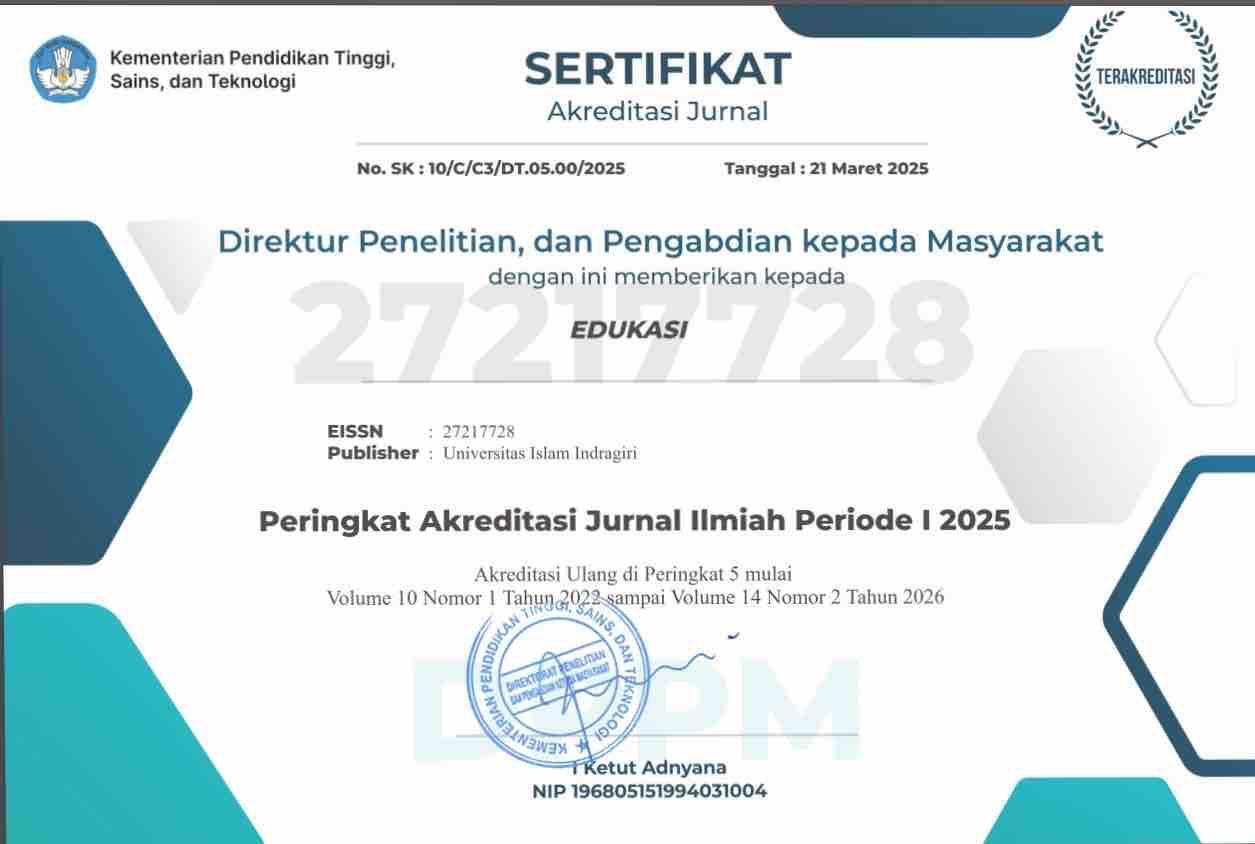The Correlation Between Teachers' Feedback And Students' Writing Achievement In Academic Writing Class
DOI:
https://doi.org/10.61672/judek.v13i1.2922Keywords:
Teacher Feedback, Writing Achievement, Academic Writing, Feedback Effectiveness, Self-RegulationAbstract
This study investigated the correlation between teacher feedback and students' writing achievement in academic writing classes at Pattimura University, Indonesia. Using a quantitative correlational design, data were collected from 30 students through a 22-item Likert-scale questionnaire measuring perceptions of feedback and document analysis of final writing grades. Statistical analysis revealed a weak and statistically insignificant relationship between teacher feedback and students' writing achievement (r = 0.075; p = 0.695), indicating that positive perceptions of feedback do not automatically translate to improved writing performance. Students demonstrated positive perceptions of feedback (M = 4.18, High category) but showed lower scores in motivation and self-regulation (M = 3.93). Writing achievement exhibited clustering at developmental thresholds—particularly at minimum passing (55 points) and minimum excellence (85 points) levels. The findings suggest that feedback effectiveness is mediated by factors such as self-regulation abilities, motivation, and existing writing proficiency. This study contributes to feedback theory by demonstrating that feedback functions within a complex system of writing development rather than as an isolated intervention, highlighting the need for a paradigm shift toward creating learning environments where students develop skills to engage with feedback effectively.
Downloads
References
Abdulhay, H., Ahmadian, M., Yazdani, H., & Amerian, M. (2020). Examining the Relationship between EFL University Students’ Goal Orientations and Self-Regulation in Writing. The Journal of AsiaTEFL, 17(2), 395–413. https://doi.org/10.18823/asiatefl.2020.17.2.6.395
Akpur, U. (2020). Critical, Reflective, Creative Thinking and Their Reflections on Academic Achievement. Thinking Skills and Creativity, 37, 100683. https://doi.org/10.1016/j.tsc.2020.100683
Ayres, R. (2023). Celebrating Writers: From Possibilities Through Publication (1st ed.). Routledge. https://doi.org/10.4324/9781032680798
Binnendyk, S., Patty, J., & Jamil, A. (2024). Self-Efficacy as a Predictor of Writing Performance: A Correlational Study of Indonesian Secondary School Students. J-Shelves of Indragiri (JSI), 6(2), 129–148. https://doi.org/10.61672/jsi.v6i2.2853
Bora, P. (2023). Importance of Writing Skill to Develop Students’ Communication Skill. Journal for Research Scholars and Professionals of English Language Teaching, 7(35). https://doi.org/10.54850/jrspelt.7.35.009
Brookhart, S. M. (2017). How to Give Effective Feedback to Your Students. In Association for Supervision and Curriculum Development (2nd ed.). Association for Supervision and Curriculum Development.
Burstein, J., McCaffrey, D., Elliot, N., & Beigman Klebanov, B. (2020). Exploring Writing Achievement and Genre in Postsecondary Writing. In Grantee Submission. https://eric.ed.gov/?id=ED608273
Carden, J., Jones, R. J., & Passmore, J. (2021). Defining Self-Awareness in the Context of Adult Development: A Systematic Literature Review. Journal of Management Education, 46(1), 140–177. https://doi.org/10.1177/1052562921990065
Cheng, S. (2020). Roles of Self-Efficacy and Learning Motivation in Learning. 2020 3rd International Conference on E-Education, e-Business and Information Management (EEIM 2020). 2020 3rd International Conference on e-Education, e-Business and Information Management. https://doi.org/10.23977/EEIM2020028
Cohen-sayag, E. (2016). Student-Teachers across the Curriculum Learn to Write Feedback: Does It Reflect on Their Writing? Journal of Effective Teaching, 16(2), 5–19.
Creswell, J. W., & Creswell, J. D. (2023). Research Design Qualitative, Quantitative, and Mixed Methods Approaches Sixth Edition (6th ed.). Sage Publications.
Cui, Y., Schunn, C. D., & Gai, X. (2021). Peer feedback and teacher feedback: A comparative study of revision effectiveness in writing instruction for EFL learners. Higher Education Research & Development, 41(6), 1838–1854. https://doi.org/10.1080/07294360.2021.1969541
Fatmawati, A., Zubaidah, S., Mahanal, S., & Sutopo. (2019). Critical Thinking, Creative Thinking, and Learning Achievement: How They are Related. Journal of Physics: Conference Series, 1417, 012070. https://doi.org/10.1088/1742-6596/1417/1/012070
Gul, A., Saleem, Z., & Zahra, N. (2023). Teachers’ Oral Feedback Practices in Promoting Academic Writing Skills of ESL Learners. Journal of Social Sciences Review, 3(1), 302–309. https://doi.org/10.54183/jssr.v3i1.157
Hattie, J. (2012). Visible Learning for Teachers (0 ed.). Routledge. https://doi.org/10.4324/9780203181522
Hattie, J., Crivelli, J., Van Gompel, K., West-Smith, P., & Wike, K. (2021). Feedback That Leads to Improvement in Student Essays: Testing the Hypothesis that “Where to Next” Feedback is Most Powerful. Frontiers in Education, 6, 645758. https://doi.org/10.3389/feduc.2021.645758
Henderson, M., Ryan, T., & Phillips, M. (2019). The challenges of feedback in higher education. Assessment & Evaluation in Higher Education, 44(8), 1237–1252. https://doi.org/10.1080/02602938.2019.1599815
Ibna, F. (2018). Factors That Influence Writing in English Language Classrooms: A Case Study of a Secondary School in the Maldives. International Journal of Social Research and Innovation, 2(1), 19–36. https://doi.org/10.55712/ijsri.v2i1.25
Kittur, J. (2023). Conducting Quantitative Research Study: A Step-by-Step Process. Journal of Engineering Education Transformations, 36(4), 100–112. https://doi.org/10.16920/jeet/2023/v36i4/23120
Klein, P., Bildfell, A., Dombroski, J. D., Giese, C., Sha, K. W.-Y., & Thompson, S. C. (2022). Self-Regulation in Early Writing Strategy Instruction. Reading & Writing Quarterly, 38(2), 101–125. https://doi.org/10.1080/10573569.2021.1919577
Lim, S. C., & Renandya, W. A. (2020). Efficacy of Written Corrective Feedback in Writing Instruction: A Meta-Analysis. TESL-EJ, 24(3). https://eric.ed.gov/?id=EJ1275821
Muste, D. (2020). The role of feedback in the teaching-learning process. Educatia 21, 19, 137–142. https://doi.org/10.24193/ed21.2020.19.17
Nakamura, S. (2016). Insights from Studies on Written Corrective Feedback: Implications for Language Pedagogy. rEFLections, 22, 89–102. https://doi.org/10.61508/refl.v22i0.112330
Patty, J. (2024). Critical Thinking Integration in Writing Development. HUELE: Journal of Applied Linguistics, Literature and Culture, 4(1), 40–48. https://doi.org/10.30598/huele.v4.i1.p40-48
Rahmat, N. H., Aripin, N., Maizura Lin, N., Whanchit, W., & Khairuddin, Z. (2020). Exploring the Connection between Critical Thinking Skills and Academic Writing. International Journal of Asian Social Science, 10(2), 118–128. https://doi.org/10.18488/journal.1.2020.102.118.128
Raoofi, S., & Maroofi, Y. (2017). Relationships among motivation (self-efficacy and task value), strategy use and performance in L2 writing. Southern African Linguistics and Applied Language Studies, 35(3), 299–310. https://doi.org/10.2989/16073614.2017.1391706
Rasteiro, I., & Limpo, T. (2023). Examining Longitudinal and Concurrent Links Between Writing Motivation and Writing Quality in Middle School. Written Communication, 40(1), 30–58. https://doi.org/10.1177/07410883221127701
Roderick, R. (2019). Self-Regulation and Rhetorical Problem Solving: How Graduate Students Adapt to an Unfamiliar Writing Project. Written Communication, 36(3), 410–436. https://doi.org/10.1177/0741088319843511
Scherer, S., Graham, S., & Busse, V. (2024). How effective is feedback for L1, L2, and FL learners’ writing? A meta-analysis. Learning and Instruction, 93, 101961. https://doi.org/10.1016/j.learninstruc.2024.101961
Wilby, J. (2022). Motivation, self-regulation, and writing achievement on a university foundation programme: A programme evaluation study. Language Teaching Research, 26(5), 1010–1033. https://doi.org/10.1177/1362168820917323
Zimmerman, B. J. (2000). Attaining Self-Regulation. In Handbook of Self-Regulation (pp. 13–39). Elsevier. https://doi.org/10.1016/B978-012109890-2/50031-7








